The CA Recall
The system is not defensible.
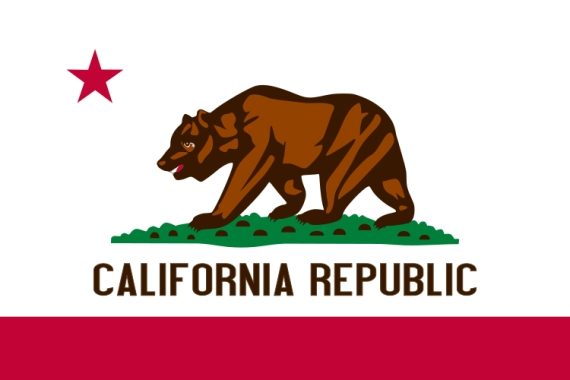
Mail-in voting in the California recall election commenced on August 14th and will continue until in-person voting on election day, September the 14th. Voters will be given one question, i.e., whether or not to recall Governor Gavin Newsom and they will also be asked to vote for a replacement in the event that Newsom is recalled. It will take 50%+1 voting YES to remove Newsome. If that comes to pass, a plurality of the vote spread out over 46 candidates will choose the next governor of the state.
The ballot looks like this:

On the one hand, the overwhelming Democratic lean of the state’s electorate should be more than sufficient to save Newsom’s job. But, polling has not been as favorable as one might have expected and the real issue is turnout.
Prior to voting starting, the polling was quite tight, but a recent shift has been in Newsom’s favor (and the fact that all citizens have the opportunity to vote by mail should redound to his favor). Here’s the polling average via FiveThirtyEight:
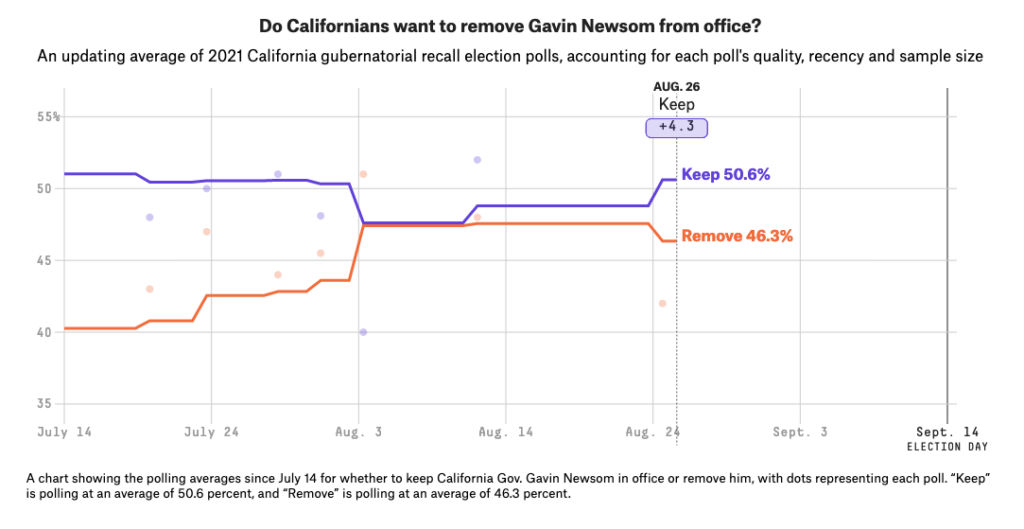
As I noted back in April, this process underscores the weakness of American political parties, especially in this context (and, really, in California in general with its Top Two system). There is a reason that the two candidates who have garnered the most attention have been Caitlyn Jenner and Larry Elder: they are (quasi) celebrities. Candidates need a way to differentiate themselves from one another. This is a major reason political parties exist. The rules of the California recall process utterly cut out this vital role for parties since it is a process of self-nomination and wherein the parties cannot control who uses their label.
But let’s focus on the rules and note that it takes an absolute majority for Newsom to keep or lose his job, but a successor can win election on a plurality. And, indeed, if Newsome does lose and front-runner-of-the-46, Larry Elder, wins he will do so with a pretty small plurality. This is significant, from a democratic theory point of view because if Newsom loses, it will be by a small margin and the NO vote in that scenario would almost certainly be substantially higher than whatever vote share Elder would win.
On the point of the rules, I would turn to my friend and sometimes co-author, Matthew Shugart
First, in April:
Recall elections only exacerbate the worst features of the presidential (including gubernatorial) form of government, in that they increase the already inevitably high personalization of the political process of such a system. As if all of what makes for (in)effective government and policy-making can be put on one individual.
[…]
rather than learn the lessons of its irrelevance in this state, the California Republican Party has learned a different lesson. While it may not win state power the normal way, it can harness grievance, the possible low turnout of a special election, and a celebrity to pick off a Democratic governor now and then. But this isn’t the California of 2003, and neither Caitlyn Jenner nor Randy Quaid, nor any of the others in the “clown car” of candidates looks ready to be the next Governator.
And earlier this month:
As the campaign-such as it is-has developed since my writing those words in late April, it is clear that it is indeed all about grievance and hardly about governance. It is also still at risk of being a low turnout affair, which is where the threat to Newsom’s tenure rests. Will enough Democrats mail back their ballots marked NO, when all the enthusiasm is on the side of the terminally aggrieved?
[…]
And therein lies the problem from a small-d democratic perspective: the rules of how California runs this type of election have always been a trainwreck waiting to happen, and such a train wreck of democracy just might happen this time. While the recall question on the ballot is a YES/NO option and thus will be decided by a majority of votes cast, the replacement option on the ballot has 46 candidates, and the winner will be the one with a plurality of votes, if the YES wins the first question. Elder leads polling by a wide margin, but with not even 25% of the vote. If we take his current polling level as a share of the decided vote, it is still only around 40%. Moreover, with no Democrat (or rather none with any hint of visibility) running on the replacement side, there are likely to be quite a few voters who vote NO but then do not select a replacement candidate. In other words, if Newsom loses a close contest, his replacement could be elected by significantly fewer votes than Newsom himself earned on the NO side. California now requires a majority for election of all other offices in the state in general elections (under the “top-two” rule), but a replacement special election is still decided by plurality (and with no party primaries).
This outcome-a sub-majority election of a candidate with less voter support than the recalled incumbent, and which can’t be discounted as fantasy-would be a massive miscarriage of democracy, whatever one’s opinion of Newsom (or Elder).
This is exactly right: the system itself is not defensible on democratic theory grounds. (Although as he notes, and as James Joyner wrote about a while back, the notion that the process is unconstitutional seems incorrect).
And, really, once this current go at it is done, the state ought to reform the process (although in my view, they ought to do away with it–I concur with Matthew about the problems of recalls, as outlined in the post from April and as expanded upon the post from August). Really, as he notes (and this applies to what just happened to Cuomo in New York), we would be better off with parliamentary-style executives and the ability of parliamentary majorities to make these kinds of decisions (which would also help shift our politics away from personalism). Clearly, in California, there is majority support for the executive, while in NY, the legislative majority lost confidence in him (and under a parliamentary system, they would have needed neither the extraordinary threshold of impeachment nor the need to shame him into quitting, but rather could have simply held a no-confidence vote).
Some additional reading on the recall, for anyone who might be interested.
Via the LAT we get an early sense of where the state is: California Politics: Who are the recall election’s early voters?
The early numbers look good for Democrats. But Republicans are betting on a late-breaking wave of pro-recall ballots — a wave probably too small to sink Newsom if Democrats turn out in numbers that parallel their true electoral strength but possibly enough to capsize the once-unsinkable governor if his supporters leave their ballots unopened or skip the option of in-person voting.
[…]
While Los Angeles and Orange counties have reported returned ballot counts consistent with the statewide average, the early response has been huge in Bay Area counties that are solidly Democratic. San Francisco reported 23% of its ballots have been returned, Alameda County reported 18% of its ballots are back in the hands of elections officials and Santa Clara County reported almost 17% of ballots have been cast.
Compare that with counties where Republicans hold sway: 11% of ballots returned in Riverside County, less than 10% in San Bernardino County, only 7% in Fresno County and a scant 1.9% of ballots returned in Kern County, according to the state survey.
And I would recommend Erza Klein’s column in the NYT: The Gavin Newsom Recall Is a Farce.
After a slow start, California ranks 10th in the nation for coronavirus vaccinations. It’s down to about three cases per 100,000 residents. Its economy is booming. According to Bloomberg, the state “has no peers among developed economies for expanding G.D.P., creating jobs, raising household income, manufacturing growth, investment in innovation, producing clean energy and unprecedented wealth through its stocks and bonds.” State coffers are flush: The governor’s office estimates a $76 billion budget surplus. The Legislative Analyst’s Office puts it at $38 billion. (The difference turns on the definition of the word “surplus.”)
So what is California doing in this moment of plenty? Deciding whether to recall its governor, of course.
It really is amazing when one thinks about it. And, on the one hand, it seems rather unlikely that the majority of Californians want the Covid policies of Florida to be put into place. But on the other, will enough Californians vote to make their views known?
The truly interesting part of the essay, however, focuses on this notion:
We [California] have become what Francis Fukuyama, the Stanford political scientist, calls a “vetocracy” — a system defined by how easy it is, and how many ways there are, to block action.
It is worth the read.

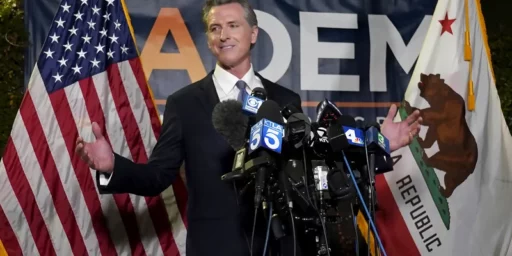
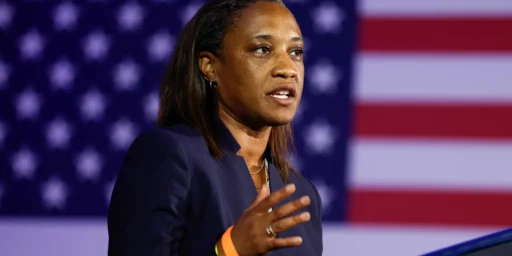
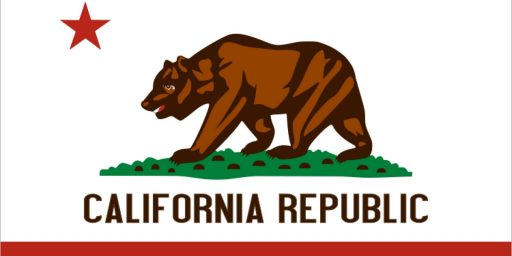
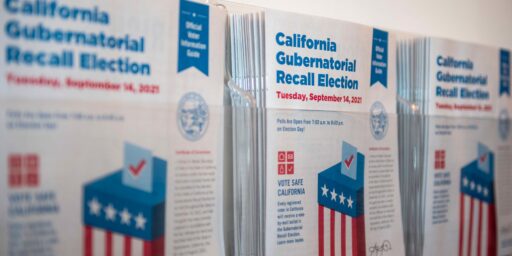

The whole thing is idiotic, but I’m not too worried about a random Republican becoming governor. Democrats have a three to one supermajority in both the Assembly and the Senate. If one of these clowns gets in he’ll spend his time accomplishing nothing, changing nothing and making a flaming jackass of himself.
I expect turnout to favor the Democrats. The ballots came to our home and it was very easy to complete them and get them into a drop box. There is more enthusiasm on the Republican side, as it is more exciting for them to imagine winning the Golden State than it is for Democrats to merely defend competent governance. But, every Dem I know is pissed that the state has been made to spend millions to run a special election and a vote for Newsom is also a vote to discourage this kind of petition driven stupidity.
One aspect that has gobsmacked me is the Democrats’ insistence that their voters should leave the second part of ballot blank, which seems to be based on allowing Newsom to remain the frontrunner for 2022 even if he loses the recall at the expense of what’s best for the party’s constituents.
Honestly, everything from the recall process itself to the month-long balloting to the fact that Larry Elder and Caitlyn Jenner are the front runners to succeed Newsome is a farce. None of it is a reasonable way to run a government.
@Michael Reynolds: “If one of these clowns gets in he’ll spend his time accomplishing nothing, changing nothing and making a flaming jackass of himself.”
Unless 88 year-old Dianne Feinstein, who should have retired at least a decade ago, ups and dies and gifts Governor Talk Show Host with a Senate seat to fill. Might want to ask RBG how that works out.
It seems the threshold for having a recall election is fairly small. Assume for a moment Newsom loses and Elder becomes gov, could Dems turn around and begin the recall process?
As Mort Kondracke (iirc) many years ago, the greatness of America in two abiding principles that must both be true simultaneously. First, even Lyndon LaRouche can run for President. Second, the nation will not elect Lyndon LaRouche.
In much the same way as the US with FG, if Californians elects Larry Elder to be governor, they deserve what they get. Especially if Democrats stay home (figuratively) or fail to select a suitable alternative to protect themselves from the GQP. People get the government they deserve.
Then the California legislature has a task to perform in reworking the recall provisions of the state’s constitution, I guess.
This is a silly question from someone who never lived in the Golden State, but if the Governor is recalled, why is the successor not automatically the Lt. Governor?
@Stormy Dragon: The “leave the second question blank” is because the message of “vote yes, but then vote to replace with x” confused a lot of people last time they had to do this.
Doesn’t seem too hard to me, but this is what experience shows.
@Scott F.:
I hope you’re right. But I fear a repeat of what I think we saw in 2016. Dems, in the back of their minds, didn’t really think Trump could get elected and some stayed home.
@gVOR08:..Dems, in the back of their minds, didn’t really think Trump could get elected and some stayed home.
Can we hope that these homers have wised up since then?
@Moosebreath:
That question came up recently. Apparently there is a contradiction in the Cali constitution, it sets forth the order of succession as being the Lt. Gov, but in the recall section has the proviso of individual who gets a plurality assuming the office.
There was an article by a law professor claiming that the recall provision is unconstitutional, due to the succession clause.
@wr:
Fuck! Had not considered that.
@Sleeping Dog:
Unless there’s another article I’m not aware of—which is perfectly possible—the lawprof made the dumbass argument that it’s unconstitutional because the winner of the election for governor might well get fewer votes than Gavin Newsome did in a binary stay/go recall. The contradiction in the two provisions was cited by frequent commenter @HarvardLaw92.
I expect if Newsom loses, there will be litigation.
Here is Article 5, Section 10 of the California Constitution:
The moment Newsom is recalled (if it were to happen), the Lt. Governor should, by the constitution of the state, become the Governor. There is no special exemption for a recall in the constitution. I expect it there to be litigation if the “No” is at 48% and some rando wins the part B with 15% or less. Last time, with Schawarznegger, he got 48%, whereas the “No” vote was only 45%.
Don’t know how a recall is actually constitutional.
@James Joyner:
I’m not a laywer, and I didn’t stay at a Holiday Inn Express last night, but reading the Constitution of the State, I don’t understand why, as I posted above, if Newsom is recalled, the Lt. Governor doesn’t become the Governor.
@EddieInCA: Also not a lawyer, but the catch seems to be in the attached election. Yes, the Lt.G will take charge until the new governor is sworn in. The flaw in the system is that the brainless trust that designed the system didn’t account for the possibility that everybody with a filing fee and the horse they rode in on would run in the pseudo replacement beauty contest. For whatever reason a recall law with an election attached was enacted and the argument is that this situation mutes the succession process. There will be a governor after the recall either way, so there’s no succession problem to address.
@Just nutha ignint cracker:
I understand that. But, like others, and as a Californian, I don’t buy “the argument is that this situation mutes the succession process”. There is no carve out in the constitution. They wrote a bad law, which, if litigated, could (and should, in my opinion) lead to a successful ruling of being against California’s existing Constitution.
How can any law go against the constitution of the state, without amending the constitution?
@James Joyner:
That part strikes me as an unvarnished good, to be honest.
The rest is a mess, however.
@Michael Reynolds: There’s that and is it not the case that a lot of CA’s Covid mitigation policies are the result of executive orders?
Do you really want a West Coast DeSantis? (Which is what Elder appears to be promising).
@EddieInCA: I think that argument, which would likely win in court, is that the recall process does not create the type of vacancy the cited clause is addressing.
But, I will also admit that I have not looked at the specifics and I may be wrong.
The fact that the state has previously (and not that long ago) used the process would also likely make it harder to win in court.
@EddieInCA:
The recall is in the constitution, I think.
@Miguel Madeira:
You’re correct. Here it is…
https://elections.cdn.sos.ca.gov/recalls/recall-procedures-guide.pdf
However, it seems to be in conflict with Article 5, Section 10.
I have no comments on the process. I will say the ballot design is far better than I expected.